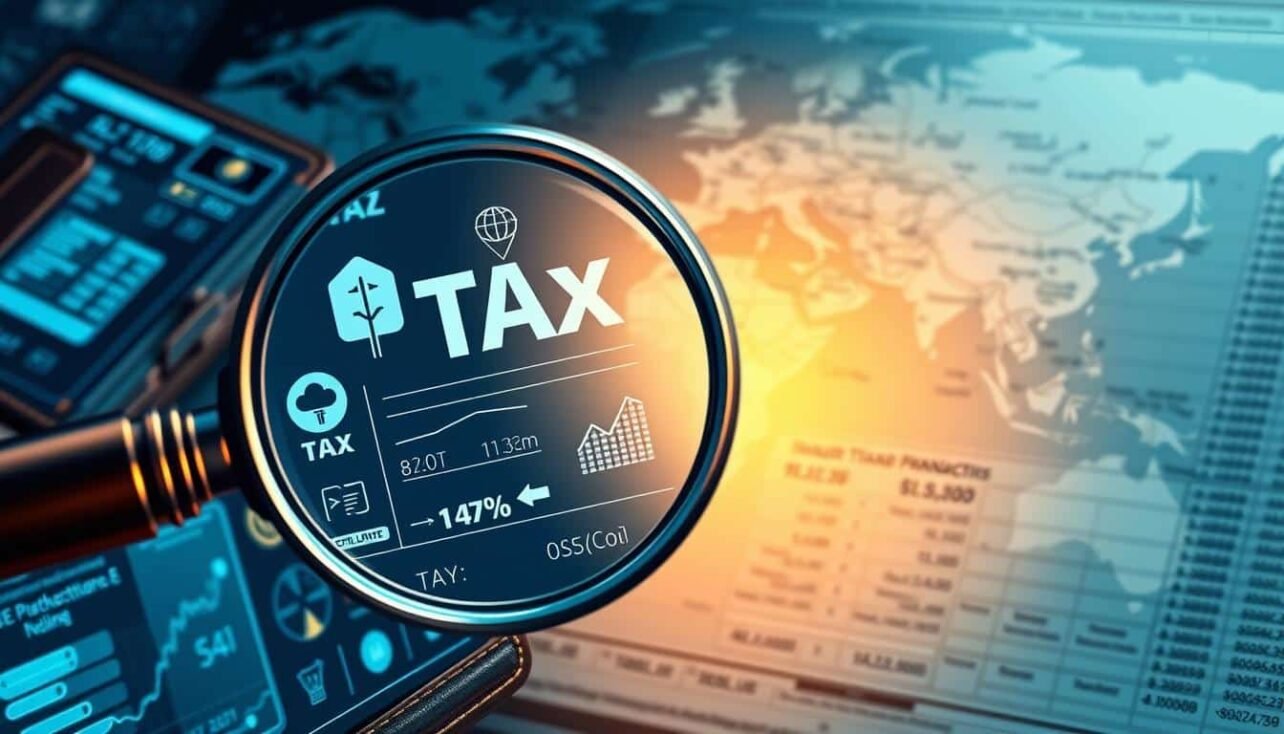Cross-border crypto transactions pose unique tax challenges for U.S. taxpayers. The IRS, international treaties, and foreign jurisdictions set tax rules. Investors must track global transfers, trades, and holdings to avoid penalties.
This guide helps understand how moving crypto across borders affects tax filings. It covers Form 8938 or FBAR reports.
As crypto use spreads worldwide, tax compliance is key. It involves knowing how income, gains, and transfers are taxed in different countries. The IRS views crypto as property, affecting capital gains for international users.
This guide explains reporting steps, treaty protections, and tools. It helps stay compliant with U.S. and foreign tax laws.
Key Takeaways
- U.S. taxpayers must report all cross-border crypto activities, even in foreign accounts.
- Capital gains taxes apply to crypto trades and sales worldwide.
- Failure to disclose crypto holdings in foreign countries risks penalties.
- Tax treaties may reduce double taxation on global crypto income.
- IRS forms like FinCEN 114 and Schedule D track cross-border crypto movements.
Understanding Cross-Border Cryptocurrency Transactions
Cross-border cryptocurrency transactions involve sending or receiving digital assets across national boundaries. These movements create unique challenges under international tax laws. Jurisdictions struggle to apply traditional financial frameworks to blockchain-based systems.
Defining International Crypto Transfers
A transfer becomes cross-border when crypto moves between wallets or exchanges registered in different countries. For example, buying Bitcoin on a U.S. platform and selling it through a European exchange triggers tax reporting under both nations’ cryptocurrency taxation rules. Tax authorities track these flows to enforce compliance.
Common Cross-Border Crypto Activities
- Trading on foreign exchanges (e.g., Binance, Kraken)
- Participating in global ICOs or token sales
- Using crypto for international payments (e.g., remittances to family abroad)
- Engaging in decentralized finance (DeFi) platforms operating outside U.S. borders
Technological Infrastructure Behind Global Transactions
Blockchain networks like Ethereum and Bitcoin’s decentralized ledgers enable instant transfers without intermediaries. Exchanges and wallets act as gateways, recording transaction metadata that tax agencies increasingly monitor. This infrastructure complicates jurisdictional claims under international tax laws, as transactions may simultaneously touch multiple countries’ rules.
The Tax Implications of Cross-Border Crypto Transactions
Understanding cross-border digital asset taxes is key. Different countries have their own rules for crypto activities. Every action with digital assets can lead to taxes on capital gains, income, or withholding.
Taxpayers must figure out these rules, even if they work in many places.
- Capital gains: Selling crypto for profit may create taxable events in the taxpayer’s home country or where exchanges are licensed.
- Income: Mining rewards, staking yields, or airdrops might be taxed as ordinary income depending on residency rules.
- Residency ties: Where you live often determines which tax system applies, even if crypto itself exists on a borderless network.
Blockchain’s decentralized nature makes tax rules tricky. For instance, a U.S. resident trading on a Singapore-based exchange faces taxes from both places. Some countries tax crypto swaps like real assets. Others might charge VAT or GST on deals.
Reporting taxes depends on transaction value and where you live. Not tracking wallet addresses, exchange rates, or dates can lead to trouble. Tax treaties can help avoid double taxation but need detailed records. As more people invest in digital assets, understanding global tax rules is crucial.
How the IRS Classifies Cryptocurrency
IRS rules on crypto transactions guide how people report digital assets. Since 2014, the IRS views cryptocurrency as property. This has big tax effects, from how gains are figured to global reporting needs.
In Notice 2014-21, the IRS made it clear that virtual currency is taxable property, not money. This means every trade of crypto, like swapping Bitcoin for Ethereum, is taxed. The tax is based on the asset’s increased value.
- Property Rules Apply: Sales, exchanges, or uses of crypto count as property dispositions.
- Capital Gains Rates: Holding periods determine whether gains are short-term (over 1 year) or long-term (under 1 year).
Recently, the IRS updated Form 1040 to ask about crypto transactions since 2023. It now asks if you sold, exchanged, or used virtual currency. Not answering can lead to penalties. The IRS also now covers DeFi and NFTs, broadening its crypto rules.
Staking rewards and airdrops are now seen as taxable income, as ruled in 2021. To follow IRS rules, you must keep track of cost basis, fair market value, and when you made the transaction.
US Reporting Requirements for International Crypto Activities

US taxpayers who trade crypto abroad must follow certain rules. The IRS wants you to report foreign deals on tax forms like Schedule B, Form 8949, and Schedule D. These forms help figure out capital gains tax from global trades.
- Schedule B: Reports foreign financial accounts holding crypto assets.
- Form 8949: Details each crypto sale, exchange, or disposition impacting taxable events.
- Form 1116: Claims foreign tax credits for taxes paid abroad on crypto gains.
It’s important to know when to file. Any trade with foreign entities or exchanges needs to be reported. The deadline is the same as regular taxes, but you can get an extension in some cases. Not filing can result in penalties up to 50% of what you owe.
When you trade, you must use USD. Use the exchange rate from the trade date. You’ll also need to keep records like exchange statements and blockchain IDs. The IRS is watching for international crypto trades, so keeping good records is key.
Foreign Account Reporting for Crypto Holders
When you hold cryptocurrency in accounts outside the U.S., you must follow U.S. foreign reporting rules. The IRS and FinCEN have strict rules for digital assets stored abroad. This affects how you handle tax treatment of crypto transfers across borders. Knowing these rules helps avoid penalties and keeps up with changing laws.
FBAR Requirements for Crypto Assets
FinCEN’s Form 114 requires reporting foreign crypto assets over $10,000 each year. This includes wallets on exchanges outside the U.S., even if they belong to U.S. citizens. Recent court decisions have made crypto subject to FBAR rules. This means you must report exchanges like Binance or Kraken if they are abroad.
FATCA Compliance for Digital Assets
- Form 8938 is for foreign crypto assets worth over $50,000 (for married couples filing together) outside certain areas.
- FATCA looks at tax liability, not just reporting. It affects income from crypto mined or traded abroad.
Threshold Amounts Triggering Reporting
- $10,000 aggregate threshold for FBAR (Form 114)
- $50,000-$300,000+ FATCA thresholds based on filing status and where you live
Not following these rules can lead to $10,000 penalties per violation. It’s wise to get help from experts. They can guide you on decentralized finance (DeFi) and stablecoins stored abroad.
Capital Gains Considerations for Global Crypto Trading
Traders in global markets face complex global taxation of virtual currencies rules. Calculating capital gains is tricky when trades happen across different exchanges and places. Each trade’s cost basis must be tracked using methods like FIFO, LIFO, or specific identification.
Choosing the wrong method can lead to paying too much or too little in taxes.
- FIFO assumes earliest coins are sold first, impacting gains/losses over time.
- LIFO prioritizes recent purchases, altering taxable amounts based on current prices.
- Specific identification requires tracking exact coins sold, crucial for minimizing tax liabilities.
Fluctuating exchange rates make things even harder. A $500 gain in crypto might turn into a $700 taxable amount if the dollar weakens. Time zone differences also play a role—trades near midnight could fall into different tax years, changing reporting dates.
U.S. taxpayers must reconcile transactions even if exchanges don’t provide forms. Specialized crypto tax software helps with tracking and currency conversions. It’s important to be consistent in your method; changing it mid-year might attract IRS attention.
Keeping detailed records of every trade’s date, price, and platform is crucial. This ensures you meet global taxation of virtual currencies rules.
Tax Treaty Implications for Cryptocurrency Investors
International tax treaties help crypto investors by reducing their tax burdens. These agreements between countries make it clear how digital assets are taxed. This avoids conflicts that could happen when different places have different rules.
The tax implications of cross-border crypto transactions depend on these treaties. Even though they were made before blockchain, they still guide how we follow the rules today.
How Tax Treaties Affect Crypto Taxation
Treaties set rules for where crypto income is taxed. For example, a U.S. taxpayer trading crypto in Germany might use treaty rules to figure out where gains are taxed. Important ideas include:
- Residency tests to see which country gets to tax first
- Rules for splitting income from activities in different countries
- Ways to solve disputes, like mutual agreement procedures
Preventing Double Taxation
Treaties help avoid paying taxes twice. Investors with crypto in countries like Japan or the UK might get credits for taxes paid abroad. This way, they don’t have to pay the same tax twice.
Treaties also decide if income is foreign or domestic. This helps investors know where to report their taxes.
Country-Specific Treaty Provisions
U.S. treaties with big countries often cover digital assets. For example, the Canada-U.S. treaty might apply to crypto trades through “beneficial ownership” rules. But, many treaties don’t mention crypto directly.
This means taxpayers have to compare crypto to other things like property or financial services. Getting help from a professional is key for DeFi or NFT transactions.
Mining and Staking Rewards in Foreign Jurisdictions
Crypto miners and stakers working across borders face international tax laws. These laws say mining rewards are taxed as income when received. The value of mined crypto at block validation is key to figuring out taxes. Staking rewards’ tax status varies by country, with some taxing at receipt and others at sale.

Rules in source countries add complexity. Miners might be seen as having a taxable presence if they use equipment or contracts. Countries like Estonia and Malta have good tax deals. But, international tax laws can still take a cut of cross-border payments. Operators need to think about:
- How to depreciate mining hardware under local tax rules
- Getting energy cost deductions across borders
- Reporting foreign entity ties with Form 8858
Stakers must also deal with different tax rules. The U.S. taxes staking as income, while the EU might treat it as capital gains. To stay compliant, consider:
- Tracking cross-border transactions automatically
- Using treaty networks to avoid double taxation
- Blockchain analytics for reward documentation
Not following tax rules can lead to big penalties. Tax experts suggest keeping separate records for each country. They also recommend checking cross-border rewards every quarter.
NFT Transactions Across International Borders
Non-fungible tokens (NFTs) make cross-border taxes tricky. Tax rules for cryptocurrency taxation vary worldwide, causing confusion for creators and buyers. To tackle these issues, it’s key to understand the legal battles and changing rules. Start by learning the basics of cross-border crypto tax to get the main ideas.
Determining Source Country for NFT Sales
Figuring out where to tax an NFT sale involves three things: the creator’s home, the platform’s location, or the buyer’s country. For example, a U.S. artist selling an NFT through a Swiss platform to a Japanese buyer might face taxes from all three places. It’s crucial to keep records of everyone’s location to avoid being taxed twice.
Import Duties and Sales Tax Considerations
- Some countries charge VAT or sales tax on digital items like NFTs.
- Customs duties might apply if NFTs are linked to physical items.
- Rules vary—see how different places treat digital.
Royalty Treatment for Ongoing NFT Payments
Payments to creators from NFT sales often count as royalties. These might be taxed at the buyer’s country, needing Form 8833 filings for treaty benefits. Keeping track of all income is essential to follow cryptocurrency taxation rules in various places.
As laws struggle to keep up with NFTs, there’s still a lot of uncertainty. It’s wise to seek expert advice to fill in the gaps in reporting and treaty applications.
DeFi Activities and Their Cross-Border Tax Complexities
Decentralized finance (DeFi) brings new challenges with cross-border digital asset taxes. Activities like providing liquidity, yield farming, and automated market maker trades make tax rules unclear. Each action, from staking rewards to flash loans, can lead to taxable events in different countries.
It’s hard to decide if DeFi gains are income or capital. For example, rewards from liquidity pools might be taxed as income in one country and capital gains in another. People need to track every transaction’s origin and where it’s taxed to follow cross-border digital asset taxes. Protocols without a fixed location make it even harder to apply tax rules based on where they operate.
- Tracking cost basis through complex yield farming paths
- Reporting decentralized exchange trades lacking traditional transaction records
- Addressing tax residency conflicts for protocol-based income
Experts say it’s important to keep detailed records of DeFi activities. Use blockchain analytics tools to track dates, asset values, and where they’re taxed. It’s also wise to get help from experts who know about crypto taxes across different countries. Keeping good records helps avoid problems with tax authorities in this area with few rules.
Record-Keeping Best Practices for International Crypto Taxpayers
Understanding IRS regulations on crypto transactions is crucial. It requires keeping detailed records to show you followed the rules. This is especially true for those who deal with cryptocurrencies across borders.
Essential Documentation for Cross-Border Transactions
Every transaction needs to be documented with:
- Date and time of the transfer
- Crypto and fiat values at time of trade
- Exchange rates used for conversions
- Purpose (e.g., investment, payment, staking)
- Counterparty identifiers (wallet addresses, platforms)
Blockchain Analytics Tools for Tax Reporting
Tools like CoinTracker and Koinly make tracking easier. They:
- Generate IRS Form 8949-style reports
- Sync with blockchain explorers for proof of transactions
- Flag cross-border activity for FATCA/FBAR filings
Retention Periods for International Tax Records
It’s important to keep records for a long time. The rules are:
- U.S. IRS requires 6 years for unreported income over $5,000
- EU directives mandate 5 years for VAT/GST-related records
- Follow the longest required retention period for multi-jurisdictional holdings
Keep your records safe with encrypted backups. Also, keep notes on how you made your calculations. Having good records is key to staying compliant.
Common Mistakes in Reporting International Crypto Transactions
Many taxpayers miss important details when reporting crypto activities outside the U.S. This can lead to penalties. Here are some common mistakes to avoid:
- Ignoring small transactions: Even small crypto trades or transfers abroad must be reported. The IRS requires all transactions to be reported to avoid penalties.
- Misapplying like-kind exchanges: Tax rules for exchanges changed in 2017. Exchanging crypto internationally does not qualify for deferred tax treatment under current law.
- Ignoring currency fluctuations: Converting crypto to fiat in foreign markets creates taxable events. It’s important to track exchange rates to calculate accurate capital gains or losses.
- Assuming foreign platforms are exempt: U.S. residents must report all global crypto activity, even on overseas exchanges. Omitting this data can lead to audits.
- Incorrect cost basis tracking: Moving crypto between domestic and foreign accounts requires precise basis calculations. Errors here can result in underpayment of taxes.
- Relying on privacy coins: Using Monero or Zcash does not erase reporting duties. The IRS treats all crypto as taxable property, regardless of anonymity features.

Not correcting these errors can lead to penalties up to 50% of owed taxes. Always document every transaction, use tracking software, and consult a tax pro familiar with tax implications of crypto trading abroad. Staying compliant can help avoid costly mistakes.
Working with Tax Professionals Who Understand Global Crypto
Dealing with crypto taxes across borders needs special skills in both crypto and international tax laws. The right expert can prevent costly mistakes in reporting and following rules. Here’s how to find the right advisor for you.
Qualifications to Look For in a Crypto Tax Specialist
Look for professionals with Enrolled Agent (EA) or CPA licenses. They should have experience with international transactions and know IRS rules well. Certifications from groups like the AICPA Digital Asset Standards Board show they know a lot about crypto.
Questions to Ask Before Hiring
- “Have you filed Form 8938 for clients with crypto holdings over $50,000?”
- “How do you address tax treaties when calculating capital gains on crypto trades?”
- “Can you explain how FATCA applies to my crypto accounts held abroad?”
When to Seek International Tax Counsel
Get expert advice right away if you:
- Transfer crypto worth more than $10,000 across borders
- Have DeFi governance tokens that make foreign income
- Get crypto payments from businesses outside your country
Good advice helps you follow crypto tax rules across borders. It also helps you get the most deductions and avoid risks. Ask for examples and references to check their experience with your situation.
Recent IRS Enforcement Actions on Cross-Border Crypto
IRS actions on global taxation of virtual currencies are getting stronger. They’ve issued John Doe summonses to get user data from exchanges. Now, the 2023 Form 1040 asks for details on crypto transactions.
The 2023 infrastructure law also requires crypto platforms to report on customer activities. These steps aim to catch hidden gains and offshore assets.
Some cases show what the IRS is focusing on. In 2022, a $1.1 billion penalty was given for not declaring crypto trades. Another case involved using mixers to hide transfers, leading to criminal charges.
Common mistakes include not reporting foreign exchange profits or leaving out cross-border transfers on tax forms.
- Blockchain analysis tools track transactions across jurisdictions
- Information-sharing agreements with 100+ countries via FATCA and OECD frameworks
- Criminal Investigation Division units now focus on crypto-related tax crimes
The IRS Criminal Investigation division is now serious about tax evasion with virtual currencies. They use geolocation data and transaction patterns to find non-compliance. Those who ignore global taxation of virtual currencies could face fines up to 50% and even criminal charges.
Global taxation of virtual currencies is now mandatory. With better tracking and international cooperation, the IRS is making sure everyone pays their taxes. Not following the new rules can lead to serious penalties under the IRS’s new strategies.
Tools and Resources for Cross-Border Crypto Tax Compliance
Dealing with taxes on cross-border crypto transactions needs good tools. Here are some key resources to help you follow international tax laws:
Tax Software for International Crypto Traders
Special platforms help track global crypto deals. CoinTracking and Koinly make reporting easy across different places. They also help with IRS Form 8938 and tracking gains/losses.
When choosing, look at how well they work with exchanges and support different places.
Government Resources and Guidance
- IRS Notice 2014-21 says crypto is property for US taxes.
- The OECD’s Taxation of Cryptoassets helps with global rules.
- FinCEN’s rules for crypto apply to everyone worldwide.
Check the IRS and OECD websites for the latest on taxes.
Industry Organizations Providing Tax Support
Groups like Coin Center and Global Blockchain Council share policy news. Joining their newsletters keeps you up-to-date. The AICPA has a list of crypto tax experts.
Even with these tools, complex cases might need a tax expert. Use them as part of a bigger plan, not alone.
Navigating the Future of Global Crypto Taxation
As more people around the world use cryptocurrencies, tax rules are changing. The IRS and other tax authorities are working together. They aim to make tax policies the same everywhere through the OECD’s global tax framework.
This effort is to stop tax loopholes and make sure everyone reports taxes correctly. It’s about fairness and following the rules.
Expect more openness in tax matters. Taxpayers will face tougher rules, like real-time reporting from exchanges. Countries will also share more tax information with each other.
The introduction of central bank digital currencies (CBDCs) could change how we see private cryptocurrencies. This might affect how taxes are applied to them.
Places known for being friendly to cryptocurrencies will influence how we follow tax laws. Investors need to keep up with changes in places like the Caribbean and Asia. These areas offer tax breaks for digital assets.
To stay ahead, it’s important to track updates from the IRS and OECD. Use the latest tax software and talk to experts in cross-border crypto taxes.
Keeping up with new rules and tools is key. As taxes on digital assets get more complicated, being flexible is crucial. This way, you can follow global standards and avoid problems like double taxation or penalties for not following the rules.
FAQ
What are the tax implications of cross-border cryptocurrency transactions?
Trading or transferring cryptocurrencies across borders can lead to tax obligations. This includes capital gains, income recognition, and following international tax laws. Each country has its own rules for taxing digital assets, so it’s important to know the tax implications.
How does the IRS classify cryptocurrencies for tax purposes?
The IRS views cryptocurrencies as property, not currency, as stated in Notice 2014-21. This means how you report gains and losses is different. It’s all about treating them as capital assets for tax purposes.
Are international crypto activities subject to US reporting requirements?
Yes, US taxpayers must follow specific rules for international crypto activities. You’ll need to use forms like Schedule B, Schedule D, Form 8949, and Form 1116. Not following these rules can result in big penalties.
What are FBAR and FATCA reporting obligations for crypto assets?
FBAR applies if you have more than ,000 in crypto on foreign exchanges at any time. FATCA requires reporting foreign financial assets, including digital currencies, on Form 8938 if you meet certain thresholds.
How are capital gains calculated on global crypto trading?
Calculating capital gains from global crypto trading is complex. You need to track your cost basis and account for exchange rate changes. Using specialized crypto tax software can make this easier.
Can tax treaties impact cryptocurrency taxation?
Yes, tax treaties can influence crypto taxes, possibly avoiding double taxation. They offer foreign tax credits and exemptions. But, the rules can differ by country.
What are some common mistakes in reporting international crypto transactions?
Common errors include not reporting small transactions or miscalculating basis. Some think foreign transactions don’t need reporting. But, privacy coins or decentralized platforms don’t exempt you from taxes.
When should I seek professional help for international crypto tax issues?
Seek tax professionals with crypto knowledge for big investments or complex DeFi activities. They can help navigate the complex world of cross-border crypto taxes.
What tools are available for managing cross-border crypto tax compliance?
There are tax software options for international crypto users, government resources with official guidance, and industry organizations for support. They can help with cross-border tax compliance issues.


No comments yet